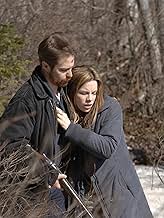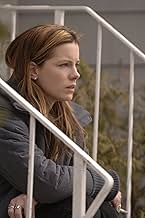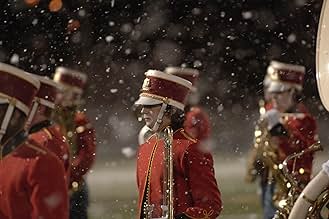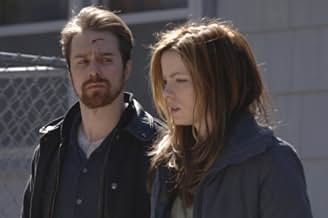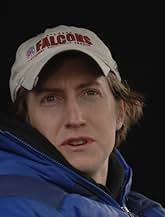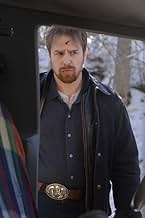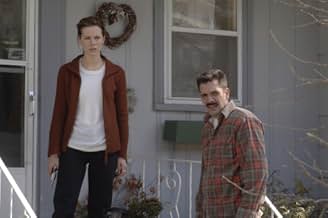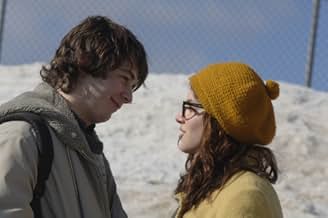NOTE IMDb
6,8/10
13 k
MA NOTE
Ajouter une intrigue dans votre langueA drama that interweaves the life of a teenager, with his old baby sitter, her estranged husband, and their daughter.A drama that interweaves the life of a teenager, with his old baby sitter, her estranged husband, and their daughter.A drama that interweaves the life of a teenager, with his old baby sitter, her estranged husband, and their daughter.
- Réalisation
- Scénario
- Casting principal
- Récompenses
- 1 victoire et 4 nominations au total
Gracie Hudson
- Tara Marchand
- (as Grace Hudson)
Slavko Negulic
- Oskar
- (as Slavico Negulic)
Avis à la une
"Snow Angels" is a glimpse in time of several relationships, some simmering and ready to boil, others cooling down, and at least one whose flame has yet to be lit. It's also a thriller, with a gunshot that is heard as the film opens. The narrative is linear but writer/director David Gordon Green, adapting the novel by Stewart O'Nan, takes the couples' stories and interweaves them in such a way that we never quite know all the secrets at the heart of the mystery. The film flashes back as we try to see how we got from there to here. In many ways the overriding theme deals with the promise of what once was versus the reality of what could have been. The "reality" is embodied in the relationships which are falling apart, as evident in the older couples. The "promise" is represented by the young couple whose lives are just beginning.
At the heart of the film is the crumbling relationship between Sam Rockwell as Glenn and Kate Beckinsale as Annie. We watch Glenn almost literally disintegrating before our eyes as he tries to get a grip on who he is and why his marriage is failing. Glenn is one of the most frightening characters I've seen outside of horror films. Kate Beckinsale's Annie is breathtaking, in every sense of the word. We bear witness to a life in free fall as everything and everyone she loves seems just out of reach. You know those dreams where you can't quite get to where you want? You try to touch it but it stays at arm's length? That's Annie's world. We so painfully watch as the madness around her takes its toll, and she weathers the way rain erodes rich topsoil, leaving little but rocky dirt underneath. Amy Sedaris is Annie's best friend Barb. She has her own marital fires to put out, and the relationship between Annie and Barb progresses in a way nobody can imagine. She is a joy to watch. In the midst of the darkness there are some lighter moments as well, and Michael Angarano (Arthur Parkinson), Olivia Thirlby (Lila Raybern), and Connor Paolo (Warren) have the lion's share of them. They are essentially the light in the darkness that surrounds the rest of the film. It should be no surprise to fans of Angarano that writer/director David Gordon Green would have chosen him to play Arthur Parkinson. He's not yet comfortable in his own skin, a trait which could describe most adolescents. He's a bit shy, nervous, and even nerdy, yet he is charming enough that everyone else seems drawn to him even though he doesn't seem to be aware of it. As Arthur's muse, Olivia Thirlby's Lila is the female representation of those awkward teenage years and an almost equal counterpart to Michael's Arthur. Their tender tiptoeing around each other is one of the most touching depictions of first love I've seen in cinema. Connor, as Arthur's best friend Warren, provides some much needed comic relief. He is a smart-ass whose ego often backfires. He's funny and not quite as smart as he thinks he is. Among other standout performances is Griffin Dunne (Don) as Arthur's flighty dad. Or should we say father, not really the "Dad" that Arthur wants or needs him to be, but the boy clings to him in this critical time of life when he is most in need of a male role model. But he won't find one here. It's this failure to connect which climaxes in an exchange between them that gave me chills. It was a jaw-dropping moment.
So much of the film is frightening that, as Green said in the Q&A afterward, he had to find actors who could infuse some humor into their characters, otherwise it would be too heavy. All around me were glistening eyes and tissues wiping away tears. At its heart it is a sad story and the audience was hushed at the end. Many have wondered how much of the film is David Gordon Green's adaptation as opposed to the Stewart O'Nan novel on which it is based. Green did discuss this at length in the Q&A. After reading the book, he knew he had to make it into a film. But he also immediately knew that it would have to be heavily adapted. The more he wrote the more he realized just how much would really have to come from his own hand. The impression I got was that what we see on screen is much more David's work than maybe even he had initially anticipated.
Jeff McIlwain and David Wingo's score is haunting, as is the film. It is used sparsely, only to punctuate the dramatic moments, as the subject matter is weighty enough that it didn't need much augmentation. It's used efficiently and effectively. The film is visually stunning. No surprise here, as it was shot by Green's longtime collaborator Tim Orr. His work is unmistakable -- gutters dripping, swings on a swing set, clouds, contrails, aluminum siding -- you can always tell his work. He sees language in shapes and movement of inanimate objects. He then connects them to the action in the story, often with a wink and a nod. Blink and you might miss it. The beautiful winter landscape of Nova Scotia gives him a palette from which he can choose many colors. The juxtaposition of Orr's beautiful photography with the horrors David Gordon Green exposes us to in "Snow Angels" is nothing short of genius.
This is a true work of art, to which many filmmakers aspire. Few hit the mark. I'm not sure if that's what David Gordon Green was trying to do here, but he did it nonetheless. There is little doubt in my mind that this is a film which will make you think about the innocence of youth and how fleeting it is, and make you wonder if it has to be that way.
At the heart of the film is the crumbling relationship between Sam Rockwell as Glenn and Kate Beckinsale as Annie. We watch Glenn almost literally disintegrating before our eyes as he tries to get a grip on who he is and why his marriage is failing. Glenn is one of the most frightening characters I've seen outside of horror films. Kate Beckinsale's Annie is breathtaking, in every sense of the word. We bear witness to a life in free fall as everything and everyone she loves seems just out of reach. You know those dreams where you can't quite get to where you want? You try to touch it but it stays at arm's length? That's Annie's world. We so painfully watch as the madness around her takes its toll, and she weathers the way rain erodes rich topsoil, leaving little but rocky dirt underneath. Amy Sedaris is Annie's best friend Barb. She has her own marital fires to put out, and the relationship between Annie and Barb progresses in a way nobody can imagine. She is a joy to watch. In the midst of the darkness there are some lighter moments as well, and Michael Angarano (Arthur Parkinson), Olivia Thirlby (Lila Raybern), and Connor Paolo (Warren) have the lion's share of them. They are essentially the light in the darkness that surrounds the rest of the film. It should be no surprise to fans of Angarano that writer/director David Gordon Green would have chosen him to play Arthur Parkinson. He's not yet comfortable in his own skin, a trait which could describe most adolescents. He's a bit shy, nervous, and even nerdy, yet he is charming enough that everyone else seems drawn to him even though he doesn't seem to be aware of it. As Arthur's muse, Olivia Thirlby's Lila is the female representation of those awkward teenage years and an almost equal counterpart to Michael's Arthur. Their tender tiptoeing around each other is one of the most touching depictions of first love I've seen in cinema. Connor, as Arthur's best friend Warren, provides some much needed comic relief. He is a smart-ass whose ego often backfires. He's funny and not quite as smart as he thinks he is. Among other standout performances is Griffin Dunne (Don) as Arthur's flighty dad. Or should we say father, not really the "Dad" that Arthur wants or needs him to be, but the boy clings to him in this critical time of life when he is most in need of a male role model. But he won't find one here. It's this failure to connect which climaxes in an exchange between them that gave me chills. It was a jaw-dropping moment.
So much of the film is frightening that, as Green said in the Q&A afterward, he had to find actors who could infuse some humor into their characters, otherwise it would be too heavy. All around me were glistening eyes and tissues wiping away tears. At its heart it is a sad story and the audience was hushed at the end. Many have wondered how much of the film is David Gordon Green's adaptation as opposed to the Stewart O'Nan novel on which it is based. Green did discuss this at length in the Q&A. After reading the book, he knew he had to make it into a film. But he also immediately knew that it would have to be heavily adapted. The more he wrote the more he realized just how much would really have to come from his own hand. The impression I got was that what we see on screen is much more David's work than maybe even he had initially anticipated.
Jeff McIlwain and David Wingo's score is haunting, as is the film. It is used sparsely, only to punctuate the dramatic moments, as the subject matter is weighty enough that it didn't need much augmentation. It's used efficiently and effectively. The film is visually stunning. No surprise here, as it was shot by Green's longtime collaborator Tim Orr. His work is unmistakable -- gutters dripping, swings on a swing set, clouds, contrails, aluminum siding -- you can always tell his work. He sees language in shapes and movement of inanimate objects. He then connects them to the action in the story, often with a wink and a nod. Blink and you might miss it. The beautiful winter landscape of Nova Scotia gives him a palette from which he can choose many colors. The juxtaposition of Orr's beautiful photography with the horrors David Gordon Green exposes us to in "Snow Angels" is nothing short of genius.
This is a true work of art, to which many filmmakers aspire. Few hit the mark. I'm not sure if that's what David Gordon Green was trying to do here, but he did it nonetheless. There is little doubt in my mind that this is a film which will make you think about the innocence of youth and how fleeting it is, and make you wonder if it has to be that way.
I refrain from rating this one as I have a lot of mixed feelings about this film. Granted it is a very deep and sensitive foray into the trappings of human emotion and relationships, but I can't reconcile why anyone would even attempt a movie like this, especially in this day and age. Although all the technical elements remain in tact, from the impeccable direction, to the heart-rending acting performances, the depth of emotion this film challenges you achieve seems a bit parochial to me, given that all we are shown is the dark side of each situation. Isn't there enough discord we must deal with in our day-to-day lives, than having to feel our emotions tumble blindly into an abyss of despair, then having to muster up the strength to climb back up and out, just to resume our lives as usual? I can't find any redeeming qualities to this film, yet I did watch it from beginning to end. It has all the qualities of a well-made film which draws you in, but once you're in you find yourself just wanting to get out but you can't, because you have to see how it all plays out after all. I guess what I'm trying to say is that there isn't any 'entertainment value' to this film, it's almost like some extended version of a story you'd expect to find in the news today, instead of on the big screen. Hollywood, maybe it's time to get back to the basics?
SNOW ANGELS is a absolute gem! It is an example of a small scale indie that is as near perfect as I could have imagined. All throughout the movie, I was reminded of a line from the poet W. B. Yeats
"things fall apart, the center will not hold." The film is a complete recreation of this concept in visual terms. With the exception of the two young high school lovers, everyone's worlds in SNOW ANGELS is slowly but surely disintegrating, and ultimately it gets very dark. But all along the way it is so beautiful. The acting is superb, the photography is compelling, and the editing technique, I found, was expert, continually dramatizing the story by powerful visual cuts. I don't know why some reviewers have complained about Kate Beckinsale's beauty as being out of place in the film's setting, a criticism that makes no sense whatsoever to me. She is wonderful in the film and seemed so right for the part. The fact that she has a very natural beauty only enhanced her role both realistically and symbolically. Sam Rockwell's performance I found extraordinary. His past roles have always reflected a broad range and the character he plays in this film may well be one of his very best. This is a movie that carefully and honestly dissects dysfunctional lives in a small, insulated world. What was so amazing to me was the film's ability to create a combination of a storyline being so very sad and bleak while at the same time that storyline's expression being so beautifully and artistically realized. Also, I don't know when I have seen such a honest exploration of young teenage love as the portraits Green draws of the young boy and girl, Arthur and Lila. The two young actors are marvelous as well and their relationship gives the film the necessary lift above and beyond the despairing tragedy of the story.
The underlying novel and this film stole my planned novel! I live in Northeast Pennsylvania (the film is set in Southwest PA). I'm one of those who threaten, promise, etc., to write a book someday but probably never will. But my main idea was to write about one of the ancient defunct communities that dot the old coal and oil regions of the state.
SNOW ANGELS does a great job at depicting lives in such communities. Especially during that part of the year when the landscape is barren and suicides spike. The profound sense of hopelessness is evident in many of the characters. Those without resources fall into profound despair. Those better off look into themselves. The result is always tragic or counter-productive. Only youth sees promise, has hope, etc.
The film was far from perfect: Rockwell and Beckinsale's story line so dominates that the lives of the other characters become almost a distraction. I doubt that's what the author intended. The climax pays off in intensity but is predictable. But the acting and script are exceptional as is the pacing and mood. For those who think the film lacks plot, the simple depiction of setting and life are story enough.
SNOW ANGELS does a great job at depicting lives in such communities. Especially during that part of the year when the landscape is barren and suicides spike. The profound sense of hopelessness is evident in many of the characters. Those without resources fall into profound despair. Those better off look into themselves. The result is always tragic or counter-productive. Only youth sees promise, has hope, etc.
The film was far from perfect: Rockwell and Beckinsale's story line so dominates that the lives of the other characters become almost a distraction. I doubt that's what the author intended. The climax pays off in intensity but is predictable. But the acting and script are exceptional as is the pacing and mood. For those who think the film lacks plot, the simple depiction of setting and life are story enough.
"Snow Angels" starts off as a fairly conventional, angst-ridden indie drama about life in an American small town, but the movie turns into a profoundly moving work after an unexpected tragedy strikes the community.
Director David Gordon Green's screenplay (co-written by Stewart O'Nan) focuses on two disintegrating marriages - one belonging to Annie and Glen Marchand, and the other to Louise and Arthur Parkinson - and the effect the breakups are having on the children and extended families. The people in both groups already seem profoundly unhappy with their lives, but when an unspeakable disaster occurs, things go from bad to worse for all concerned.
"Snow Angels" features insightful writing, sensitive direction and a profound sense of place and season (it takes place in the deep, dark days of a Midwestern winter, though the film itself was filmed in Nova Scotia). It's not an easy movie to watch at times - its emotions wrenching and its characters' weaknesses all too human and recognizable – but excellent performances by Kate Beckinsale, Sam Rockwell, Michael Angarano, Jeanetta Arnette, Deborah Allen and Griffin Dunne, among others, make it worthwhile viewing.
Director David Gordon Green's screenplay (co-written by Stewart O'Nan) focuses on two disintegrating marriages - one belonging to Annie and Glen Marchand, and the other to Louise and Arthur Parkinson - and the effect the breakups are having on the children and extended families. The people in both groups already seem profoundly unhappy with their lives, but when an unspeakable disaster occurs, things go from bad to worse for all concerned.
"Snow Angels" features insightful writing, sensitive direction and a profound sense of place and season (it takes place in the deep, dark days of a Midwestern winter, though the film itself was filmed in Nova Scotia). It's not an easy movie to watch at times - its emotions wrenching and its characters' weaknesses all too human and recognizable – but excellent performances by Kate Beckinsale, Sam Rockwell, Michael Angarano, Jeanetta Arnette, Deborah Allen and Griffin Dunne, among others, make it worthwhile viewing.
Le saviez-vous
- AnecdotesSam Rockwell really did hit his head on the truck, and punch the tree. (reference an interview at vimeo.com/859232) Previously he had gotten tips from a stunt man on how to head-bang the truck without hurting himself too much. However, when he hit the tree with his knuckles, he did it for real, and hard. He visited the hospital in the evening.
- GaffesIn the scene where Arthur takes a swig from a bottle of beer hidden on the floor, he raises it with the label facing him. In the next cut scene, as he lowers the bottle, the label can be clearly seen facing the camera.
- Citations
Louise Parkinson: You never know what fate has in store for you, sweetheart. It's funny how you can tell the fake smiles in pictures.
Arthur Parkinson: You notice people don't bring out cameras on sad days?
- Bandes originalesSledgehammer
Written by Peter Gabriel
Published by Real World Music, Ltd. (PRS) for the World / Pentagon Lipservices Real World (BMI) Admin for USA & Canada
Courtesy of Real World Music, Ltd. and Lipservices Music Publishing
Performed by Atlantic Region Cadet Tri-Service Band
Meilleurs choix
Connectez-vous pour évaluer et suivre la liste de favoris afin de recevoir des recommandations personnalisées
Détails
- Date de sortie
- Pays d’origine
- Site officiel
- Langue
- Aussi connu sous le nom de
- Les anges de neige
- Lieux de tournage
- Sociétés de production
- Voir plus de crédits d'entreprise sur IMDbPro
Box-office
- Montant brut aux États-Unis et au Canada
- 402 858 $US
- Week-end de sortie aux États-Unis et au Canada
- 14 247 $US
- 9 mars 2008
- Montant brut mondial
- 414 404 $US
- Durée
- 1h 47min(107 min)
- Couleur
- Mixage
- Rapport de forme
- 2.35 : 1
Contribuer à cette page
Suggérer une modification ou ajouter du contenu manquant







